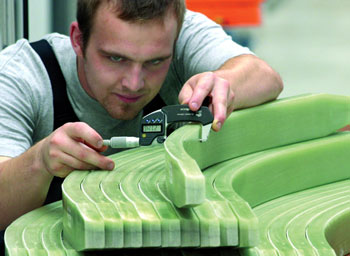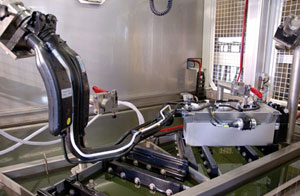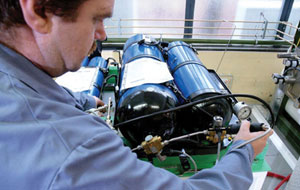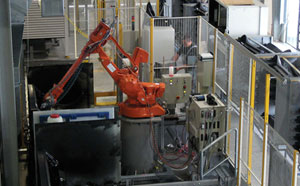
SAXONY-ANHALT, GERMANY

Performance
einrich von Nathusius is what you might call “old school” when it comes to making parts for automobiles in Germany.
Part of a 200-year family tradition of entrepreneurs and manufacturing in Saxony-Anhalt, Nathusius today runs a high-tech automotive components supplier that makes parts for BMW, Porsche, Volkswagen and other top carmakers.
And he says he wouldn’t do it anywhere else.
Nathusius, managing director of IFA-Maschinenbau Verwaltungsgesellschaft mbH in Haldensleben, runs a powertrain manufacturing company that built a new plant in 2002 in Gardelegen. The firm employs 500 people and last year achieved about €100 million (US$157 million) in sales.
The support of state and local authorities “ensures the level of flexibility that is especially important in the automotive supplier sector,” says Nathusius. “Moreover, Saxony-Anhalt offers excellent labor market conditions.”
Government support and work-force productivity are, in fact, two major reasons why Saxony-Anhalt in eastern Germany has become one of the leading locations in Central Europe for automotive suppliers.
About 250 auto component manufacturers employing more than 18,000 workers make their home in Saxony-Anhalt, making this sector the fastest-growing jobs generator in the state in 2006.

Employment in the sector jumped 13.7 percent that year.
BMW, Mercedes-Benz and VW rely on Saxony-Anhalt suppliers for light-alloy engine blocks, steering and transmission parts, light-alloy car bodies and interiors. More than 10 original equipment manufacturing plants – including those of VW, Skoda, BMW, Opel and Porsche – are within a radius of 250 kilometers (155 miles).
Household names in the European automotive industry – AKT, Novelis, ThyssenKrupp Automotive, IFA-Gruppe, Magna Powertrain Germany, NEMAK Europe further Rautenbach Guss and Trimet Aluminum – are based in Saxony-Anhalt. So are some “newcomers” to the trade, including Recticel and Polytec, component suppliers to VW and Audi.
New plant announcements in the past year include projects from such companies as Mobis Parts Europe, which will extend the European logistics network for Hyundai-Kia in Saxony-Anhalt, and Hamburg-based forklift truck maker Jungheinrich AG, which will build a new plant for powered pallet trucks in Landsberg in 2009.
All of these firms are supported by the MAHREG Automotive, the Automotive Suppliers’ Competence Network of Saxony-Anhalt. The MAHREG Automotive is considered the most important industry-research alliance in Saxony-Anhalt, providing comprehensive collaboration among key industry players throughout the German state.
It is support like that which makes IFA’s Nathusius a big believer in doing business in Saxony-Anhalt.
“The subsidies that we received when we were founded here were critically important,” he tells Site Selection, “but there were also non-monetary subsidies as well. For example, the government officials here at the city, county and state level are not bureaucrats. They are very flexible. As a result, we can turn around investments here much faster than we ever could in the western part of Germany.”
Nathusius says that in western Germany, “you need at least 12 months to add a new production line. Here, we can be producing on a new line in six months. That is absolutely fantastic. Everyone in government is interested in adding investment and building the industry.”
Nathusius is equally sold on the work force in Saxony-Anhalt. “The motivation of our people to build up the industry here is excellent,” he says. “They are highly skilled, and they are willing to work hard. If I received a call from VW on Friday afternoon with a request to supply parts to them on Monday, my workers would start producing those parts the next morning and work all day Saturday and Sunday, if necessary, to fill the order.
That would be unbelievable in the western part of Germany, where the labor unions have great influence. But the workers here are interested in producing more and more.”
The IFA executive says the area has a long history of skilled engineering and craftsmanship, dating back many centuries. In the 20th century, the Magdeburg area became known both before and after World War II as the center of machinery for Europe.
“We have very good skilled engineers here,” he adds.

“We are the market leader for weight savings and for lighter products. We are producing fiberglass products and then combining them with the frames that we manufacture here.”
The wage scale also makes Saxony-Anhalt competitive, as wages are typically 15 to 20 percent lower in the Magdeburg region than they are in western Germany.
Logistics play a vital role too. “We are close to Berlin and are located in the middle of Europe,” notes Nathusius. “We are very close to both Western Europe and Eastern Europe. Countries like Poland and the Czech Republic are easily accessible from Saxony-Anhalt. This is the center point of Europe, and that is very important for logistics.”
Saxony-Anhalt is also very accessible to Munich, Stuttgart, the Ukraine and Russia, adds Nathusius. His company has fared so well in Saxony-Anhalt, says Nathusius, that it is planning to expand again.
“We are in the position to invest about another €30 million to €40 million,” he tells Site Selection. “We have a joint venture with a Japanese company called NTN, the world market leader for bearings and No. 2 in the world for half-shafts. Together, we are investing in a new production line.”
Nathusius’ firm is not alone. Many automotive companies are expanding these days in Saxony-Anhalt. Former tractor factory Schönebeck became Ambulanz Mobile GmbH & Co. KG and since 1991 has become a major outfitter of rescue vehicles. About 160 workers are employed in preparing more than 1,000 such vehicles per year.
ELDISY GmbH has been producing rubber door seals, sealing and damping elements in Gardelegen, north of Magdeburg, since 2002. The 300-worker company recently earned one of the highest awards from Saxony-Anhalt Minister of Economic Affairs Dr. Reiner Haseloff when it was named the “Company of the Month” in February.
One of the largest automotive firms in the state is Altm?rker Kunststofftechnik AKT, which employs 1,300 people making injection-molded engine compartment parts, interior assemblies and vehicle safety components in Gardelegen.

Since 1991, the firm has supplied these components to VW, Audi, Seat, Skoda, General Motors, Daimler and BMW.
Firms in the southern portion of Saxony-Anhalt are also doing well in the auto sector. Just over a year ago, Munich’s Sud-Chemie took over parts of Tricat, a catalyst producer based in Chemiepark Bitterfeld-Wolfen. Other plastics specialists have settled in the region known as the Central German Chemical Triangle, between Leuna and Schkopau.
Leuna-Harze GmbH has become the fourth largest epoxy resin producer in Europe and a leading supplier of “highly refined products” to European carmakers. Dow Chemical managing director Manfred Aumann recently announced that the European Automotive Division of the U.S. Group will be concentrated in Schkopau. Proximity to buyers was a key factor, he said.
University research plays a key role in supporting Saxony-Anhalt’s automotive sector. Otto-von-Guericke-Universit?t Magdeburg, for example, supports research in five disciplines: powertrains, mechatronics, telematics, manufacturing engineering and virtual reality.
Site Selection Online – The magazine of Corporate Real Estate Strategy and Area Economic Development.
©2008 Conway Data, Inc. All rights reserved. SiteNet data is from many sources and not warranted to be accurate or current.